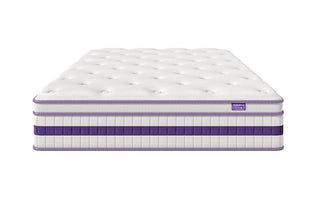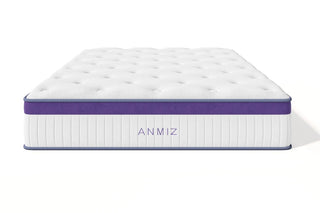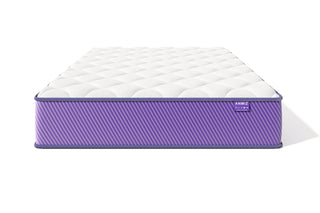The way you sleep influences how you feel throughout the day. Many people compare Firm vs Soft Mattress options when searching for the ideal balance of comfort and support. The mattress you choose affects spinal alignment, muscle recovery, and long-term sleep quality. A well-chosen mattress can ease tension and improve rest. A poorly matched one can contribute to discomfort, fatigue, and poor posture.
Your body type, sleep position, health concerns, and comfort preferences all play a role in determining the right firmness level. Understanding how different mattress firmness levels affect pressure relief and support helps you make an informed decision. This comprehensive guide explores the differences between firm and soft mattresses, their benefits, drawbacks, and considerations, so you can choose the mattress that best supports your sleep needs.
- 1. Understanding Mattress Firmness and Why It Matters
- 2. Firm Mattress
- 3. Soft Mattress
- 4. Firm vs Soft Mattress: Sleep Position Considerations
- 5. Firm vs Soft Mattress: Body Weight Considerations
- 6. Health and Pain Considerations
- 7. Mattress Materials Influence Firmness Feel
- 8. Temperature and Firmness
- 9. Durability and Longevity
- 10. Price Considerations
- 11. FAQs
- 12. Conclusion
Understanding Mattress Firmness and Why It Matters
Mattress firmness refers to how soft or firm the mattress feels when you lie on it. Although firmness is often described on a scale from soft to extra firm, the experience can vary based on mattress materials, weight distribution, and personal comfort perception. When considering Firm vs Soft Mattress types, keep in mind that firmness is different from support. Support refers to how well the mattress maintains spinal alignment. Firmness refers to the surface feel.
Good sleep requires both comfort and proper body support. A mattress that is too firm may create pressure points. A mattress that is too soft may cause the spine to bend unnaturally. Finding the right balance helps reduce muscle tension, prevent joint discomfort, and support deeper rest.
Firm Mattress
A firm mattress has a stable, less cushioned surface. It provides a flat, even sleeping platform. Many firm mattresses use dense foam or tightly packed coils to prevent sinking into the surface. The structure encourages the spine to remain aligned in a neutral position.
Firm mattresses are popular among sleepers who prefer feeling supported rather than cradled. They provide a solid feel that can benefit specific sleep positions or health needs.
Benefits of Firm Mattresses
A firm mattress is often supportive for back and stomach sleepers. It keeps the hips and shoulders from sinking too deeply. This promotes spinal alignment, reducing tension in the lower back. Firm surfaces may also improve circulation for some individuals, as the body weight is distributed evenly across the mattress.
People with larger body types may benefit from a firm mattress because it resists excessive compression. The mattress maintains shape and support over time. Many firm mattresses also feel cooler because the body rests on top rather than sinking in.
Potential Drawbacks of Firm Mattresses
Some individuals may find a firm mattress uncomfortable, especially if they have joint sensitivity. Side sleepers may experience increased pressure on shoulders and hips. This can lead to discomfort during sleep or stiffness upon waking. Those used to soft mattresses may also need time to adjust to the firmer feel.
Soft Mattress
A soft mattress provides a more cushioned surface. It allows the body to sink slightly into the bed. This creates a contouring effect that supports curves and relieves pressure. Soft mattresses are typically made with plush materials such as memory foam, cushioning layers, or pillow-tops.
Soft mattresses are popular among sleepers who want a cozy, enveloping feel. They can help ease pressure for individuals with joint pain or lighter body weight.
Benefits of Soft Mattresses
Soft mattresses support side sleepers by cushioning the shoulders and hips. They help maintain spinal alignment by allowing the body to rest naturally. This reduces pressure points and supports relaxation.
Those with tender joints may benefit from the soft contouring. The mattress cradles the body, reducing tension during sleep. Many soft mattresses also provide a gentle hug-like feel, promoting comfort and ease when falling asleep.
Potential Drawbacks of Soft Mattresses
Soft mattresses may allow excessive sinking for some sleepers. This can lead to spinal misalignment. Stomach and back sleepers may experience lower back strain if the hips sink too deeply. People with heavier body types may find that soft mattresses wear more quickly due to compression. Over time, the mattress surface may lose support.
Firm vs Soft Mattress: Sleep Position Considerations
Your preferred sleep position plays an important role when choosing between firm and soft mattresses. Each position requires different support levels to maintain alignment.
Side Sleepers
Side sleepers benefit from softer mattresses. A soft mattress cushions the shoulder and hip, preventing sharp pressure points. If a mattress is too firm, it may push joints into uncomfortable positions.
Back Sleepers
Back sleepers typically need balanced support. A medium-firm to firm mattress helps maintain natural curvature of the spine. It prevents the hips from sinking too deep, which can cause back discomfort.
Stomach Sleepers
Stomach sleepers usually require firmer mattresses. A firm surface keeps the spine aligned and prevents the lower back from arching downward.
Combination Sleepers
People who shift positions during the night often benefit from medium firmness. This range provides both support and ease of movement.
Firm vs Soft Mattress: Body Weight Considerations
Body weight affects how a mattress feels. A mattress responds differently depending on how much pressure is applied.
Lightweight sleepers under 130 pounds may find firm mattresses feel too hard. The mattress may not compress enough to cushion pressure points. Soft mattresses often provide better comfort.
Average-weight sleepers between 130 and 230 pounds may choose medium-firm or soft mattresses depending on sleep position and preference.
Heavier sleepers above 230 pounds typically benefit from firm or medium-firm mattresses. Firmer surfaces prevent deep sinking and provide long-lasting support.
Health and Pain Considerations
If you experience chronic pain, your mattress choice may influence daily comfort. Lower back pain may improve with a firm or medium-firm mattress because it supports spinal alignment. Joint pain may improve with softer mattresses that provide cushioning.
Those with conditions like arthritis may benefit from soft mattresses due to pressure relief. However, individuals with back conditions may find firm surfaces supportive and stabilizing.
Mattress Materials Influence Firmness Feel
Mattress feel depends on its internal structure. Memory foam mattresses offer contouring and movement absorption. Latex mattresses provide balanced support with gentle bounce. Hybrid mattresses combine coils with foam for blended comfort and stability. Innerspring mattresses offer a supportive core with varying surface cushioning.
Each material type can be found in firm and soft versions. The key is to try mattresses or evaluate material structure based on your needs.
Temperature and Firmness
Firm mattresses often feel cooler because they allow more airflow and minimize deep sinking. Soft mattresses may retain heat due to body contouring. Cooling materials, breathable foams, and moisture-wicking covers can help regulate temperature regardless of firmness choice.
Durability and Longevity
Firm mattresses generally maintain shape longer due to less compression. Soft mattresses may break down sooner depending on materials and usage. High-density foams and quality support layers improve longevity in both firmness types.
Price Considerations
Both firm and soft mattresses exist across a wide price range. Quality depends more on material durability than firmness level. Higher-density foams, natural latex, and hybrid structures typically cost more but last longer.
Investing in the right mattress can support sleep health for years, making cost an important part of long-term well-being.
FAQs
Q: How do I know if I need a firm or soft mattress?
A: Consider your sleep position, body weight, and comfort preference. Side sleepers and lightweight individuals often prefer softer mattresses. Back and stomach sleepers benefit from firmer surfaces that maintain spinal alignment.
Q: Can a mattress be too soft or too firm?
A: Yes. A mattress that is too soft may cause sinking and misalignment. A mattress that is too firm may create pressure points. The right balance provides comfort and support.
Q: Does a firm mattress help with back pain?
A: A firm or medium-firm mattress can help support proper alignment and reduce lower back strain. However, individual comfort needs vary based on body shape and sleeping posture.
Q: Will a soft mattress lose support more quickly?
A: Soft mattresses may wear faster if made with low-density materials. High-quality foam and latex can maintain softness and support over time.
Q: Should couples choose medium firmness?
A: Medium firmness can be a good compromise when partners have different preferences. It balances support and cushioning.
Conclusion
Choosing between a Firm vs Soft Mattress requires understanding your body’s needs, sleep style, and long-term comfort goals. A firm mattress offers stable support and alignment, especially for back and stomach sleepers. A soft mattress provides cushioning and pressure relief, ideal for side sleepers and those with joint sensitivity. Consider your body weight, mattress materials, and sleep habits. The right mattress enhances rest, reduces stress, and contributes to healthier sleep patterns.












